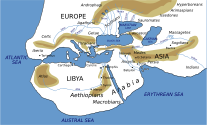Androphagi
This article relies largely or entirely on a single source. (July 2015) |
Androphagi (Ancient Greek: Ἀνδροφάγοι, cannibals, literally "man-eaters"), according to Herodotus, lived some distance north of Scythia in an area later hypothesised to be the forests between the upper waters of the Dnipro and Don.[1][2] Also according to Herodotus, when King Darius the Great led a Persian invasion into Scythian territory in what is now Southern Russia, the Androphagi fled when the warring armies passed through their territory.[3]
Etymology
Historian Marija Gimbutas has hypothesized[4] that "Androphagoi" is a Greek translation of *mard-xwaar "man-eater" in the old North Iranian language of the Scythians. From *mard-xwaar one can derive "Mordva" or "Mordvin", the Russian name of the Finnic Erzya and Moksha peoples of east-central European Russia. From Herodotus we can deduce a location for the Androphagoi that is approximately the same as that occupied by the modern Mordvins. Max Vasmer rejected this etymology as unsubstantiated.[5]
Ancient accounts

Herodotus first wrote of andropophagi in his Histories, where he described them as one of several tribes near Scythia. An extra note indicates that the andropophagi are cannibals, as reflected in their name:
The manners of the Androphagi are more savage than those of any other race. They neither observe justice, nor are governed, by any laws. They are nomads, and their dress is Scythian; but the language which they speak is peculiar to themselves. Unlike any other nation in these parts, they are cannibals.
— Histories, Book 4 (Melpomene), trans. George Rawlinson, 1858-1860
Pliny the Elder later wrote in his Naturalis Historia that the same cannibals near Scythia wore the scalps of men on their chest.
The Androphagi, whom we have previously mentioned as dwelling ten days' journey beyond the Borysthenes, according to the account of Isigonus of Nicæa, were in the habit of drinking out of human skulls, and placing the scalps, with the hair attached, upon their breasts, like so many napkins.
— Naturalis Historia Book 7, Chapter 2, trans. John Bostock and Henry Thomas Riley, 1855
See also
References
- ^ Herodotus iv. 18, 106
- ^ One or more of the preceding sentences incorporates text from a publication now in the public domain: Chisholm, Hugh, ed. (1911). "Androphagi". Encyclopædia Britannica. Vol. 1 (11th ed.). Cambridge University Press. p. 976.
- ^ Herodotus iv. 125
- ^ Marija Gimbutas's "The Balts" and "The Slavs"
- ^ Max Vasmer, "Russisches Etymologisches Wörterbuch". Heidelberg University, Universitätsverlag Carl Winter, 1950–1958.
